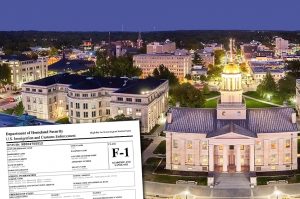Judge cites lack of confidence in Homeland Security, issues injunction in UI case
May 15th, 2025 by Ric Hanson
U.S. District Court Judge Rebecca Goodgame Ebinger previously issued a short-term temporary restraining order barring Homeland Security from deporting the four, and on Thursday she provided the additional protection of a preliminary injunction that will last while the plaintiffs’ underlying case against the government is being litigated. According to the lawsuit, each of the plaintiffs was admitted to the United States on an F-1 student visa. The students claim Homeland Security has violated their due process rights by terminating their student status without legal justification or explanation.
Named as defendants in the case are Secretary of Homeland Security Kristi Noem, and the U.S. Department of Homeland Security, of which Immigration and Customs Enforcement, or ICE, is a part. Also named as a defendant is Acting Director of ICE Todd Lyons.

(Main photo courtesy of the University of Iowa; form courtesy of the U.S. Department of Homeland Security)
In Thursday’s decision, Judge Ebinger addressed Homeland Security’s claim that the students had wrongly interpreted a change in their student status in the federal database called the Student and Exchange Visitor Information System, or SEVIS. The agency had argued that the status listing was essentially meaningless “data” that had no actual impact on the students’ visas or status.
Ebinger rejected that claim, ruling that “SEVIS status is not meaningless and distinct from actual status.” She noted that Homeland Security itself had well-established record of equating a student’s SEVIS status with the student’s actual status, and that educational institutions, including the University of Iowa, rely on the SEVIS records to accurately determine a student’s status.
In addition, Ebinger rejected Homeland Security’s claim that its actions were not arbitrary and capricious – the standard for reversing administrative action, which is what the four UI plaintiffs seek as part of their lawsuit. The judge noted there was “no suggestion” made by anyone that the four plaintiffs met Homeland Security’s own standards for revoking student status, such as conveying falsehoods to Homeland Security, engaging in unauthorized employment, committing a serious crime or failing to engage in educational studies.
In deciding to issue the injunction, Ebinger also stated that she had “little confidence” that going forward, Homeland Security and ICE will comply with the law and “act consistently with pertinent regulatory factors.”
In a statement that underscores the difficulty lawyers for Homeland Security are likely to face as the underlying case moves forward, Ebinger stated in her decision that “imposing immediate negative consequences on persons while disregarding governing law and regulations is arbitrary and capricious.” The four UI plaintiffs, she said, “have demonstrated a strong likelihood of success on the merits” of their case.
Thursday’s injunction bars Noem, Homeland Security and ICE from initiating or ordering the arrest, detention, or transfer of the four plaintiffs — Prasoon Kumar, Songli Cai, Haoran Yang, and Sri Chaitanya Krishna Akondy — out of the court’s jurisdiction without first providing adequate notice to the court so the plaintiffs’ counsel can contest any such action.


